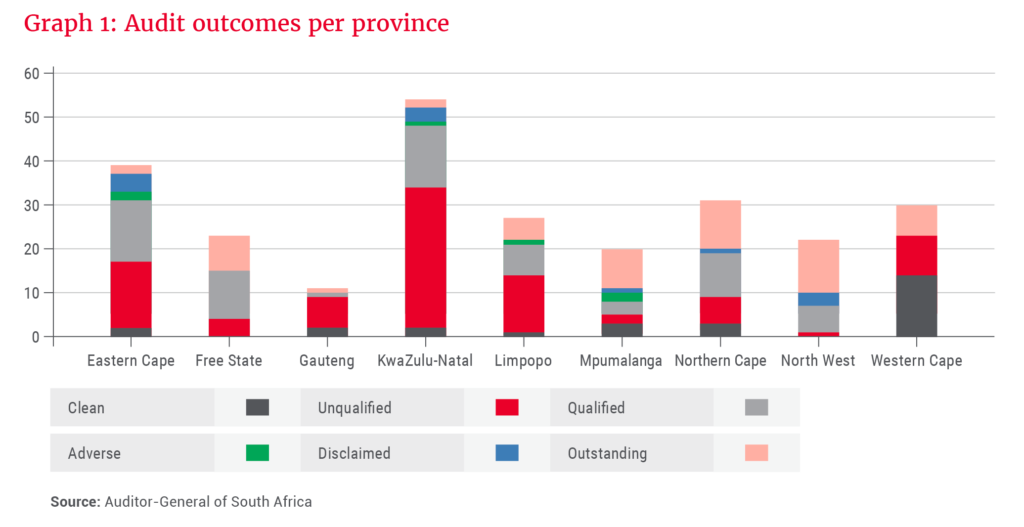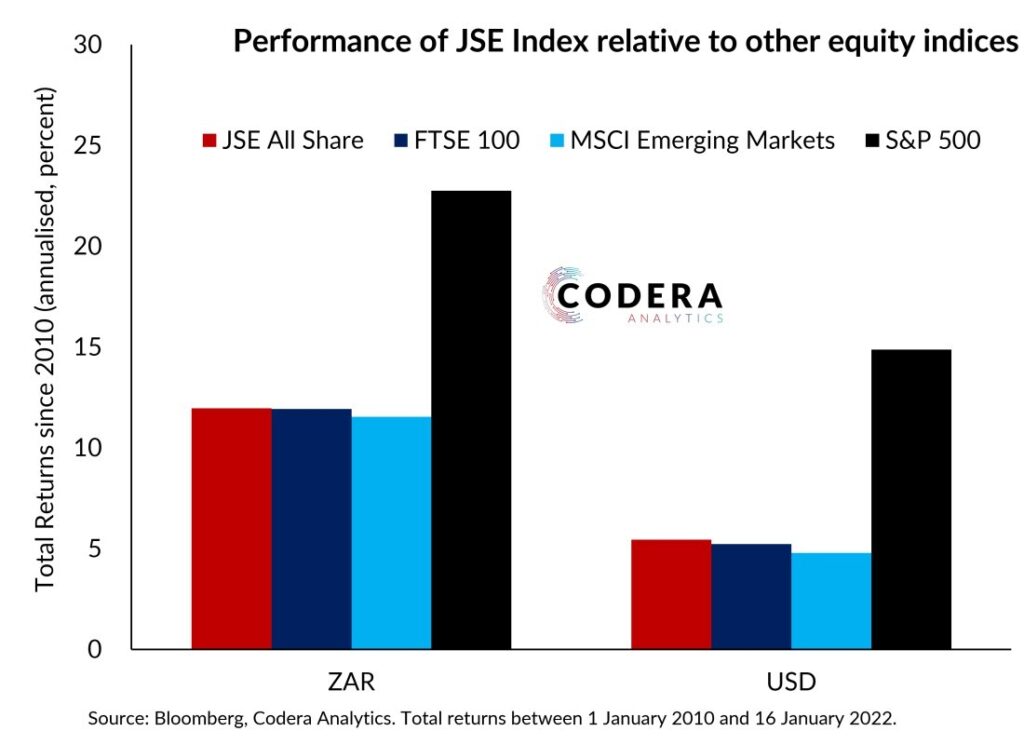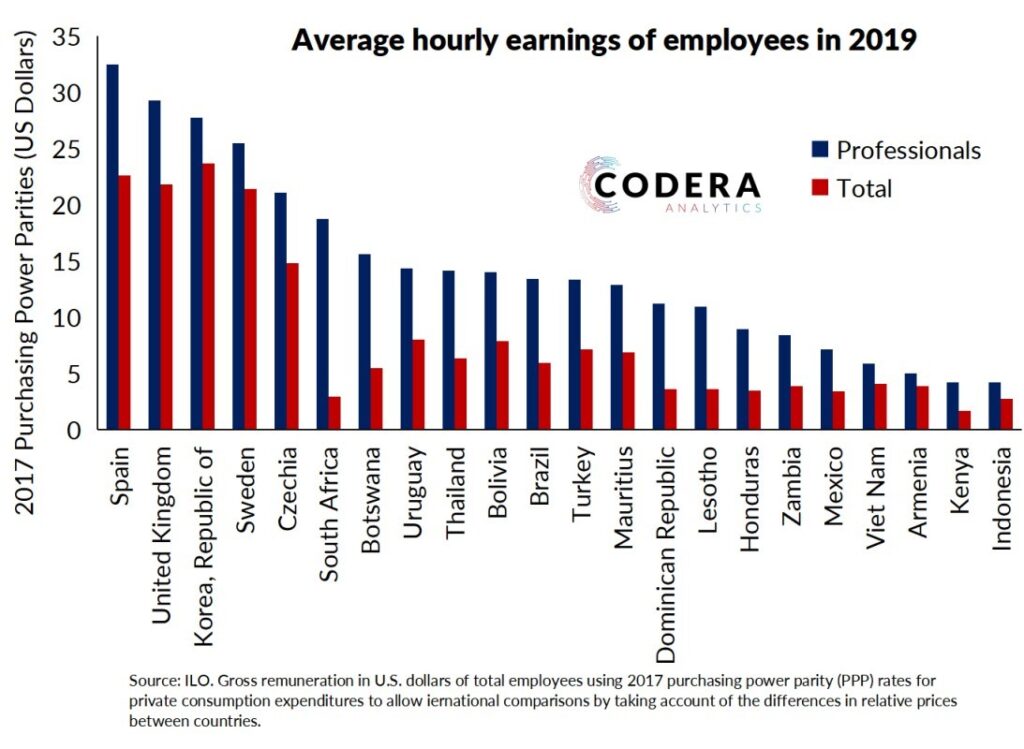Economy
Performance:
- Our economy has stabilised and is set for a 1.5 -7% GDP growth this year (the World Bank had said 2.1%).
- With a population growth of 1.5% and a burgeoning inflation rate, such growth is not going to impact meaningfully on unemployment.
Most of the salient issues are well-known, i.e.:
- Our state has promised R595bn in sky-pie developments; but lacks the money to pay for this.
- Prasa and SANRAL are, ahem challenged; don’t expect our transportation system to improve.
- BIG is unaffordable but we are going to have a go at it anyway.
- EWC was halted in its tracks but is certainly not dead: wait for the politicos to use the existing legislation to better effect. To put this political red herring in perspective: we spent R2.9m on VIP protection – more than on land redistribution last year. Furthermore, the state has suspended funding to subsistence farmers – EWC, certainly does have merit but at present is little more than a vote-gathering exercise of our kakistocracy (don’t read this in Afrikaans).
- Educational BS: South Africa has some 700,000 tertiary students of whom some 48% is funded by NSFAS loans. The total debt outstanding, last year, to the State from this venture was R36bn and the debt to universities is such that the sustainability of this project must be questioned: after all, most graduates cannot find work and can certainly not repay the debt owed by them.
- Our municipalities are in death spiral – the culture of non-payment of rates and services, mismanagement, incompetency and corruption has dramatically impacted on their functioning. The following graph, ex Alan Grey/the AG, is instructive:

Where to?
So, where does one invest? The following graph, drawn from Codera, says it all:

If you do wish to invest locally, few of the top funds outperformed our JSE index.
The above is not a pleasing picture. What to do? One answer, which I confess I have mixed feelings about, is the so-called democratisation of the management of public finances. The idea is that governments should encourage greater public participation in their budget process. This should also enhance see-through and discourage corruption. By so doing one would align budget appropriations with taxpayers’ priorities and boost tax compliance, morale and encourage prudent use of resources.
Whatever, the last word on this topic goes to Malala; we have issues but at least it’s not Zuma.
Business
The graph above suggests that one should invest overseas. On investment, you should understand the role of artificial intelligence in the investing – machines outperform humans: https://www.sciencedirect.com/science/article/abs/pii/S1544612321005547
Much is made of late in the press on the topic of compulsory vaccinations for work purposes and I understand that this issue will be taken to the Concourt soon. The fact is that the case that has fuelled this furore is a minor one out of the CCMA which is hardly a court of great significance. One needs to approach such a business ruling with circumspection as the elephant in the room is that court did not address the issue of whether such a decision by an employer is lawful in the light of our constitution.
Shorts:
- The one ray of economic light is that our agribusiness is growing and that a good season is predicted.
- Depressingly, 26% of senior civil servants are unqualified for the jobs they hold.
- The Sharemax saga has developed a new twist – it’s successors in title, Nova is now in audit difficulties and indications are that shareholders will not be paid out in full.
- Our power costs have increased by 582% since 2007 and another massive hike is on the cards. The green solution, driven by environmentalists, is superficially attractive but the costs of replacing a fully functional fossil fuel system is way out of our league.
- Running a side hustle? Be careful: https://businesstech.co.za/news/business/551318/middle-class-south-africans-are-turning-to-side-hustles-heres-what-the-law-says/
Practice
News:
- Batohi says that the NBA is not in crisis; really? The results prove otherwise, leaving us with accountability which is as good as dead.
- An example of bureaucratic incompetency may be found in the news that the general manager of Domestic Intelligence had never fully passed his security clearance…yawn.
- A graph that says that the income of workers, in South Africa, are far outstripped by that of professionals, follows. In fact, South African professionals earn well compared with overseas equivalents and probably benefit from better purchasing power:

- The difference in earnings between ordinary workers and leaders in South Africa can be as much as 541 times – gratifying if you are professional but sobering from a distance.
- This is what you, as attorney/Advocate should be earning: https://businesstech.co.za/news/finance/548762/heres-how-much-money-lawyers-earn-in-south-africa-2/?
- I had served as advocate in the state legal advice in the AG’s office in Windhoek and the process, through which opinions and legislation was put before release, was rigorous. Watching the debate about many pieces of legislation such as, of late, Aarto, in which the state eventually has to back down, I often wonder about the standard of state legal advice.
- Noises are being made to fast-track corruption cases through special courts; sounds great but who will man these and who, in the police force, will do the investigation? The idea is not new to our legal system but is not that easy to implement.
- Sisulu can wriggle, and rightly pass off her comments on the Constitution and judiciary as fair comment, but when she calls a black judge a mentally colonised African house negro, she is pushing it. On the topic of Indigenous versus Roman law, again fair comment, but lacking in understanding of a system refined over thousands of years in a great civilisation versus a very local and limited (one can hardly even call it an equivalent) system.
Hard news:
- Is a right of first refusal in an unregistered lease, enforceable against a successor in ownership, of the land affected? The answer is not as straightforward as one might imagine; a pre-emption could be seen as a personal right enforceable against only the contracting party or it could be seen as an integral part of the lease applicable to an enforceable against any landowner. Ask me.
- Executory donations in ANCs were reasonably common in the past – the groom would promise to give certain assets to his bride in order to equalise their asset spread and so would assets beyond the reach of his creditors. Is maintenance, dressed up as a donation, valid? https://www.golegal.co.za/ante-nuptial-contract-donation/
- Joint ownership of land, especially in families, is common. How does one terminate this if the relationship does not work: http://www.saflii.org/za/cases/ZAFSHC/2020/81.html
- Parties may agree that a price be fixed when contacting. May such a valuator change his mind after setting a value? http://www.saflii.org/za/cases/ZASCA/2021/173.html
- You tell the boss that you’re ill, but you go and watch rugby – may you be dismissed? https://www.cliffedekkerhofmeyr.com/en/news/publications/2022/Practice/Employment/employment-law-alert-17-january-If-you-say-you-are-sick-you-better-be-sick-The-Labour-Appeal-Court-addresses-the-CCMAs-lenient-approach-to-dishonesty.html
- The new Property Practitioners Act will come into being on 1 February and will repeal the existing legislation and regulations. Notable is that a disclosure document must be attached to each deed of sale and signed by both parties – insist on it.
- Life-right holders in a retirement development scheme may halt the development of such a scheme: http://www.saflii.org.za/za/cases/ZACC/2021/51.html
- Members of a close corporation hold common law derivative actions against that CC: Naidoo versus Dube Trade port; ask me for a copy. (ex West)
- Duties of a conveyancer: http://www.saflii.org.za/za/cases/ZAECPEHC/2022/4.html (ex West)
- The repudiation of an inheritance must be clear (I this week, saw a vanilla version of such an attempt by a colleague, which left much to be desired): http://www.saflii.org/za/cases/ZASCA/2022/4.html (ex STBB)
- Many contracts for the sale of land that had lapsed are revived by agreement. The revival contract must comply with the Alienation of Land Act to be valid. I hold a case dealing with this and will provide this on request.
- Parties, to a contract of sale, should note, in contact, the capacities in which they act. Typically, this scenario occurs where a surviving spouse/executor signs a contract but does not specify in which capacity (or both) she (no I’m not being sexist) acts. https://www.saflii.org/za/cases/ZAGPJHC/2021/753.html
- The definition of survivor in section 1 of the Maintenance of Surviving Spouses Act, is to be read as if it includes the surviving partner of a permanent life partnership in circumstances where the surviving partner has not received an equitable share in the deceased partner’s estate. http://www.saflii.org.za/za/cases/ZACC/2021/51.html
Property
Essentials:
- The residential property market for R1-R3m houses is upbeat. The difference between nominal price increases and inflation has resulted in a real -1.8% decrease in average sales prices.
- House/flat rental is downbeat, with additional financial pressure being placed on tenants. Flat vacancy rates stand at about 10%.
- Retail property is awash with talk of parallel solutions; read, the impact of web sales on retail sites.
- Office property is oversupplied, with an average vacancy rate of 14.25% nationally. Conversion to other uses is widespread.
- Industrial property is probably the best performing sector at the moment. It is least oversupplied.
Generally, predictions hold that vacancy rates of properties to let will increase into double digits. On the upside is an indication that banks are competing more for bonds (there is a small rise in bond approval rates) and offer an average rate of prime less 0.21% as opposed to 0.02% in the 4th quarter 2020. Having said this, the average bond rates last year was 0.4%.
One draws the conclusion that buying to let is not a great idea at the moment as tenants are battling to pay and rentals are not going to escalate much in the short term.
Finally, the Land bank has been absent from news pages for a while: not much has changed and the old problems persist. That bank has just received a capital injection of R7bn from the state. So much for rowing its own boat.
Comment
The Parliament fire is a bellwether of the state of management in South Africa. Given the litany of things that had gone wrong on the Cape branch of our Parliament having burnt down, it is amazing that the bugger-up happened only now. Two reports on this issue drew my attention:
- In 2016 and information-gathering trip had been undertaken to Hungary to benchmark our security standards against those applicable there. Nothing of what was learnt was implemented.
- It turns out that the Parliament archives had been digitised in 2007 but it is reported that half of the scans are semi-legible or unreadable. It is almost beyond belief that no one actually checked what the result of the scans was.
Our defence force is underfunded. Nowhere is this more visible than our not having a single serviceable Gripen strike-craft. It is said that half of our 26 Gripens have been cannibalised for spares. This of a plane which is currently priced at US $85m per unit. Our acquisition of these was and is irrelevant to and unaffordable for a country like ours. If, state spending had been democratised as suggested above, these would certainly have not been purchased.
Lighten up
Legal come on lines:
Lawyer to prospective date: I find being a tax lawyer fun.
Date thinks: High income and low expectations. Perfect.
Husband to wife, both in bed: Are you in the mood to exercise our constitutional rights?
A lawyer went to the Police Station wishing to speak with the burglar who had broken into his house the night before.
“You’ll get your chance in court.” said the Desk Sergeant.
“No, no, no!” said the lawyer. “I want to know how he got into the house without waking my wife.
I’ve been trying to do that for years!”

Author: Dr Daan Steenkamp
Still looking for your dream home. Feel free to give one of our developers a call today.
Tom Eastwick – The Gates, Hilton and Garlington, Hilton | 072 297 2699 | tom@devdirect.co.za
Janet Channing – Waterford Residential Estate, Howick | 082 570 5834 | janet@devdirect.co.za
#retirement #gatedestate #luxuryliving #midlandsliving